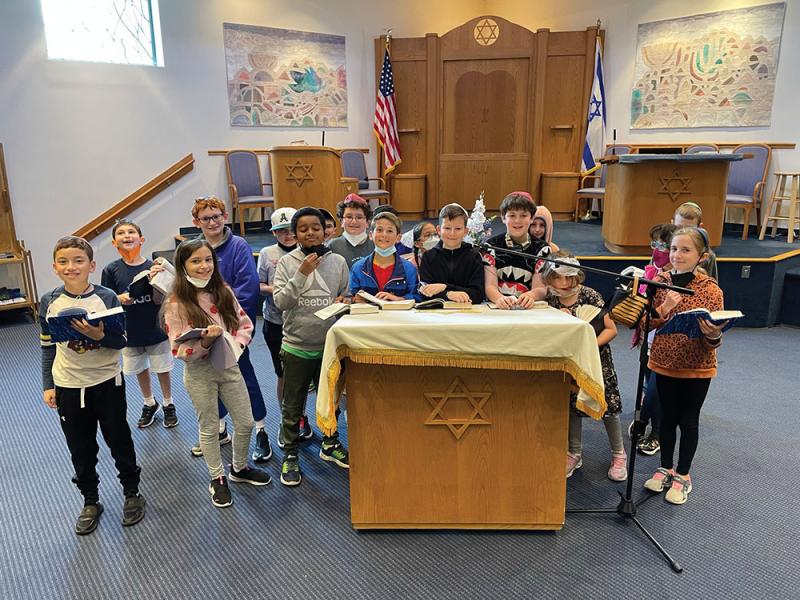
By Ellen Braunstein
Anybody want to teach?
That’s the gist of an email sent out twice to all 630 families at Temple Isaiah in Howard County. Faced with the impending retirement of older teachers, hastened by the pandemic, the synagogue briefly considered waitlisting students. Instead, the emails drew the right number of teachers needed to fill out the staff this year, said Rabbi Daniel Plotkin, rabbi educator at the Reform congregation in Fulton.
He considers it only a temporary solution.
A shortage of qualified religious school teachers is a big problem facing synagogues everywhere, say administrators in the Baltimore-Washington D.C. region. The solutions, they say, range from increasing pay, hours and benefits to providing more teacher training and cultivating a pipeline into the profession.
The problem is nothing new, and “the answer is not hiring anybody you can find,” said Rabbi Cherie Koller-Fox, president of NewCAJE (Coalition for the Advancement of Jewish Education) near Boston. The nonprofit organization holds an annual professional development conference that draws several hundred Jewish educators. “If there’s a mother who comes into the school and says, ‘Oh, you know, I spent my junior year in Israel…’ Some are not educated or trained in the field.”
Koller-Fox continued. “During the pandemic, people were treated without a great deal of respect for all they were doing. The pandemic was an occasion to cut costs, and people got pretty burnt out.”
TalentEducators is a global nonprofit that addresses recruitment and training of Jewish educators. CEO Aharoni Carmel said, “We have seen the shortage grow tremendously as many programs moved online during the pandemic and changed their hiring practices. Now that they are back in person they need to hire people who are local again.”
Synagogues experiencing shortages are combining grades, creating one job where there once was two or three. Beth Shalom Congregation in Columbia is one of them. “I’m having quite an impossible time finding teachers,” Education Director Louis Nagel said. He posts on JewishJobs.com and advertises at University of Maryland Hillel and at other campuses. He joined an online discussion group of regional Jewish school administrators. There are no recent takers for his Conservative synagogue with 250 families and 78 children enrolled in religion school.
The days of stay-at-home moms taking on Sunday classes have waned, Nagel said. “It seems like they want their own time on weekends, and people are just working so hard at their nine-to-five jobs that they don’t have time for it,” he said.
School administrators say that pay starts at $25 an hour for entry level and increases to $70 an hour for more experienced teachers. That doesn’t account for time spent outside of the classroom. And there are no benefits unless one counts free High Holiday tickets, Nagel said. “A wealthier synagogue may send you to an educator’s conference,” Nagel said.
Amy Goldberg directs the religious school at Beth El Congregation of Baltimore, which serves 1,550 families and enrolls more than 220 students. “It’s been increasingly challenging to find religious school teachers,” she said. “I think it’s probably a combination of the pandemic and paying teachers an appropriate salary. We only need a few hours a week, and there’s a lot of work that goes into it. I think the turnover rate is a challenge.”
Melissa Werbow runs the nondenominational synagogue school for Hill Havurah in Washington, D.C. The Capitol Hill congregation has 200 families and 110 students. “We’re using younger and less-qualified teachers than we have had to in the past,” Werbow said. “It definitely feels like a shift from feeling like I’m giving somebody a gift of a job to feeling like someone is doing me a favor by spending time in our school on the weekends.”
Werbow addressed the curriculum, making it easier to teach with far less work needing to be done outside of school. “It makes it easier for people who are not as qualified or professional to still share their passion and their love of being Jewish even if they don’t have a deep background.”
TalentEducators sees a solution in synagogues working together to create half-time or full-time positions, said Carmel, whose organization is a project of The Jewish Agency for Israel and the Ministry of Diaspora Affairs. “They can synchronize the classes and days so that one educator can work in two or three synagogues,” he said. “The synagogues can also work together to provide benefits to these educators if they are full time across a few synagogues. The way the system works right now, only directors of religious schools — and sometimes not even directors — are full time. This creates a revolving door of part-time employees who cannot commit beyond that year.”
Julie Tonti, director of educator services for the Council for Jewish Education in Baltimore, said that the city and Howard County synagogues are indeed looking at pooling resources to give teachers the equivalent of a full-time job between more than one synagogue. “We’re looking into all the different schools that we work with and trying to find out their needs. This shortage has been something that they’ve asked for a lot more help on, specifically recruitment and retention,” he said.
Plotkin of Temple Isaiah’s 310-student school is looking ahead at creating a pipeline of educators to replace his senior staff that are retiring. “I’m already forward thinking about the fact that we need to engage and develop a new generation of religious school teachers, both those who can teach Hebrew and those who can teach Judaics,” he said. “It’s really about finding and identifying younger people in our community who have a love of Judaism, the desire to share that with the children and the ability to do so. Not everyone is cut out to be a teacher who can control and handle a class full of students.”







I want to thank you for running this article. I was largely energized to enter the Jewish education profession because I had a dreary experience of “Hebrew school” education as a child. My daydreaming was me at the front of the room teaching the class, making the learning fun and interesting. As an adult, I believed I could create a synagogue school environment that children would find exciting, engaging, and fulfilling. A significant obstacle our synagogue school programs face is recruiting teachers, a condition that adversely influences the quality of our programs. If this article has any effect, I hope it would be to get people to recognize that the teacher pool is shallow and to encourage folks to dive into that pool. Who is that religious school teacher? Ideally, it is someone with a love of children, an engaging personality, Jewish knowledge, and teacher skills. These last two items are somewhat negotiable. Education directors or mentor teachers can coach the subject learning and the skills of classroom management and lesson planning. The verse that comes after Shema in the siddur and the Torah, “Hear, O Israel: Adonai is our God” is “And you shall teach these words to your children” (Devarim 6:7). This means, that anyone and everyone has the capacity and responsibility to contribute to this effort. A favorite verse of mine says, “Yours is not to complete the task, but neither are you free to desist from it” (Pirke Avot 2:21). Your next step is easy, contact a local religious school education director and ask them if they are looking for teachers. You have about a 75% chance of getting a “Yes” answer.
Louis Nagel, PhDBeth Shalom Congregation, Columbia (MD)